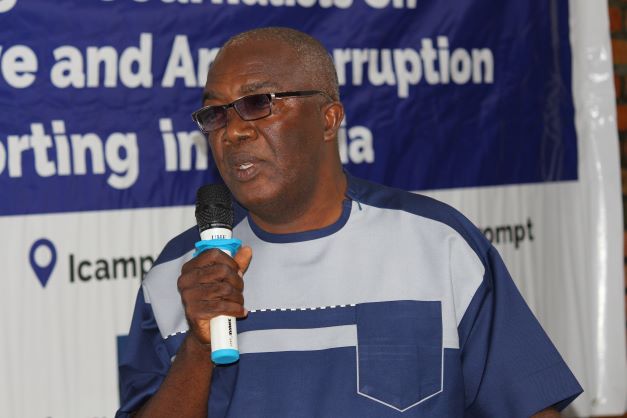Outgoing Independent Information Commissioner Cllr. Freeman Says 2010 FOI Law Has Been Violated With Appointment Of New IC Without Screening
PHOTO: Cllr. Mark Bedor-Wla Freeman, former IIC boss
Another controversy has erupted over yet another appointment/nomination scenario, as the Unity Party administration of President Joseph N. Boakai struggles to fully constitute its nearly three-month-old government.
The latest spotlight has been placed on the Independent Information Commission (IIC) by the outgoing IC, Cllr. Freeman, who is also West Africa’s Representative of the Africa Network of Information Commissioners (ANIC).
In a press statement issued in Monrovia today, Monday, April 15, 2024, the outgoing Independent Information Commissioner, Cllr. M. Bedor-Wla Freeman points to violation of the 2010 Freedom of Information Act.
SEE STATEMENT BELOW
PRESS STATEMENT ON PRESIDENT BOAKAI’S RECENT APPOINTMENT OF INFORMATION COMMISSIONER
By Cllr. Mark Bedor-Wla Freeman, Independent Information Commissioner, Republic of Liberia; and West Africa’s Representative within the leadership of the Africa Network of Information Commissioners (ANIC)
Monday, April 15, 2024
Ladies and Gentlemen of the Fourth Estate, As Liberia’s outgoing Independent Information Commissioner, I called you to here to speak on a very important national issue which has the propensity to affect Liberia’s image negatively; and expose our country to ridicule and possible international isolation. I refer to President Joseph Nyuma Boakai’s recent appointment of an Independent Information Commissioner, without public screening as required by the Liberia Freedom of Information Act (2010), the Model Law on Access to Information for Africa, and international best practices.
- Liberia Freedom of Information Act (2010)
Section 5.1 Oversight Body says: “The implementation of this Act, including compliance therewith, shall be overseen by an Independent Information Commissioner to be appointed by the President with the advice and consent of the Liberian. The Independent Information Commissioner shall be a Liberian of high moral character and generally acceptable to many stakeholders…” I am putting emphasis on the latter part of the section to make the point that screening is essential to determining that a person is a Liberian of high moral character and generally acceptable to many stakeholders. In our case, a panel comprising the Ministry of Information, Civil Service Agency, youth and other stakeholders screened us prior to nomination, conformation and appointment.
- Model Law on Access to Information for Africa
On the necessity for public screening, Section 46 says in part: “Selection and appointment of the information commissioners must be undertaken by the appropriate authority subject to the following conditions:
- The call for nominations must be made public and issued by the appropriate authority; and
- Identification of candidates and the interview process must be transparent and include public participation…”
- International Best Practices
In almost all parts of the world, particularly in responsive democracies, screening is an integral part of selecting and appointing Information Commissioners. And Liberia has been in the forefront and an example for other countries to follow. In 2013 I was in Germany as Africa’s only Information Commissioner, participating in freedom of information policy formulation. In the same year I was in Abuja, Nigeria, sharing Liberia’s experiences as the only country in Africa with an Information Commissioner. In 2017 I attended a national conference on freedom of information in The Gambia and served as a facilitator as that country transitioned from the Yaya Jammeh era to new democratic dispensation.
This situation becomes even more embarrassing when one looks at Liberia’s position in the history of access to information in Africa. In 2010 when Liberia passed its Freedom of Information Act, it was acclaimed as one of the best laws in West Africa, Africa, and the entire world. In 2012, following thorough public screening, I was nominated, confirmed by the Liberian Senate and appointed as the first and only Information Commissioner in Liberia, and on the entire African continent. Twelve years later, in 2024, Liberia is appointing my successor without public scrutiny. This is the basis of my concern: we should continue to be a pacesetter in the international community; we should not and must not retrogress when it comes to access to information.
Conclusion
As I conclude, please let me dispel any misguided notion that I am taking this position because I want to continue to serve as Liberia’s Independent Information Commissioner. The truth is that I have no desire to remain in office after more than 10 years. I made this position known in a letter to President Joseph Nyuma Boakai more two months ago. In that letter, to which I have received no acknowledgement/reply, I requested for a meeting with the President to discuss issues relating to Freedom of Information in Liberia; Liberia’s status and rank in the international community; and the need to set up vetting mechanisms to find my successor in line with the law. However, up to the time of the President’s appointment of an Information Commissioner, and up to this day I have had no opportunity to meet the President.
Let me end by thanking the Liberian Government for my time in office as Independent Information Commissioner.

